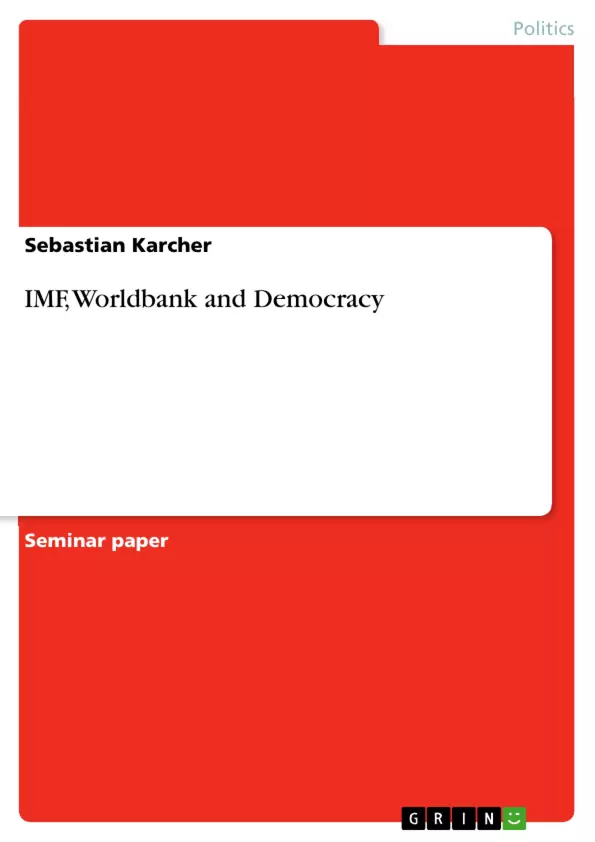Introduction
Since 1982, when the debt crisis broke out in Latin America the continuous presence of IMF and World Bank has become part of the every day life of Latin American countries. While the programs have changed both in nature and in size, the criticism on the structural adjustment programs (SAPs) has been a constant factor throughout the last years(1). The debate on SAPs focused basically(with minor variations) on two key questions: Their effect on the economy and their social costs, the latter including income distribution(2). The tendency of scientific studies reached from vigorous defence of IMF/WB policy to complete rejection.
[...]
_____
1 Cf. e.g. Rainer Tetzlaff, Weltbank und Währungsfond – Gestalter der Bretton-Woods Ära, Opladen 1996, pp. 26-30.
2 Since the beginning of the end of the 80s, environmental costs could be added to this list. Due to the limited extent of this paper they cannot be included.
Inhaltsverzeichnis (Table of Contents)
- 1. INTRODUCTION
- 2. STRUCTURAL ADJUSTMENT: ECONOMIC AND SOCIAL ISSUES.
- 2.1 20 Years of SAPS - An Outline
- 2.2 Criticism on the BWI
- 2.2.1 Economic Criticism
- 2.2.2 Social Criticism...
- 2.2.3 How the BWI deal with criticism
- 2.3 Conclusions.
- 3. STRUCTURAL ADJUSTMENT AND DEMOCRATIC DEVELOPMENT.......
- 3.1 The Public Image of the Bretton Wood Institutions.
- 3.1.1 Painful memories
- 3.1.2 The BWI as US-dependent institutions.
- 3.1.3 The BWI and Neo-liberalism.……......
- 3.1.4 The Impact on Democratic Development.
- 3.2 Good Governance and its Implications
- 3.2.1 Good Governance as a WB/IMF policy.
- 3.2.2 Criticism on Good Governance
- 3.2.3 Good Governance and Democracy...
- 4. CONCLUSION.........
Zielsetzung und Themenschwerpunkte (Objectives and Key Themes)
This paper aims to analyze the political effects of Structural Adjustment Programs (SAPs) implemented by the World Bank and IMF in Latin America, specifically focusing on their influence on democratic development. While recognizing the economic context, the paper emphasizes the political dimension of these programs, considering how they impact existing democracies in the region.
- The economic and social effects of Structural Adjustment Programs (SAPS)
- The evolution of SAPs over the past two decades, including the Washington Consensus and its critique
- The public image of the Bretton Woods Institutions (BWI), particularly the IMF and World Bank, and their perceived influence on Latin American democracies
- The concept of "good governance" as a WB/IMF policy and its potential implications for democratic development
- The influence of SAPs on political culture in Latin America
Zusammenfassung der Kapitel (Chapter Summaries)
Chapter 2 examines the economic and social aspects of SAPs, outlining their evolution over the past 20 years and the main criticisms they have faced. It explores the arguments of both critics and supporters of WB/IMF policy, analyzing the economic dimensions of these programs and their social consequences. This chapter summarizes the key concepts and problems associated with SAPs without delving into extensive economic analysis.
Chapter 3 focuses on the political effects of SAPs, independent of their economic outcomes. It first examines the public image of the World Bank and IMF and their perceived relationship with the United States. The chapter then explores the implications of "good governance" as a WB/IMF policy, including criticisms of this approach and its potential impact on democratic development. The analysis uses the concept of political culture to evaluate these effects.
Schlüsselwörter (Keywords)
The key focus of this paper lies in examining the influence of Structural Adjustment Programs (SAPS) on democratic development in Latin America, specifically examining the policies of the World Bank and IMF. The paper delves into the economic and social effects of SAPs, including the Washington Consensus, "good governance," and the public perception of the Bretton Woods Institutions (BWI). It analyzes how SAPs impact political culture and democratic institutions in the region.
Frequently Asked Questions
What are Structural Adjustment Programs (SAPs)?
SAPs are economic policies implemented by the IMF and World Bank in developing countries, particularly in Latin America since the 1982 debt crisis, to ensure debt repayment and economic restructuring.
What are the main criticisms of the Bretton Woods Institutions (BWI)?
Criticism focuses on the high social costs of their programs, negative effects on income distribution, and their perceived role as tools of U.S. foreign policy and neoliberalism.
How do SAPs impact democracy in Latin America?
The paper analyzes how these programs influence political culture and can potentially undermine democratic development by prioritizing economic conditions over social welfare.
What is the concept of "Good Governance" in IMF/World Bank policy?
"Good Governance" is a set of criteria used by the BWI to ensure that borrowing countries have efficient, transparent, and accountable administrative structures, though it is often criticized as political interference.
What was the significance of the 1982 debt crisis?
The 1982 crisis in Latin America marked the beginning of a continuous and controversial presence of the IMF and World Bank in the daily lives of these nations.
Does the paper include environmental costs of SAPs?
While environmental costs are recognized as a factor since the late 80s, they are not included in this specific paper due to its limited scope.
- Citar trabajo
- Sebastian Karcher (Autor), 2001, IMF, Worldbank and Democracy, Múnich, GRIN Verlag, https://www.grin.com/document/1975



